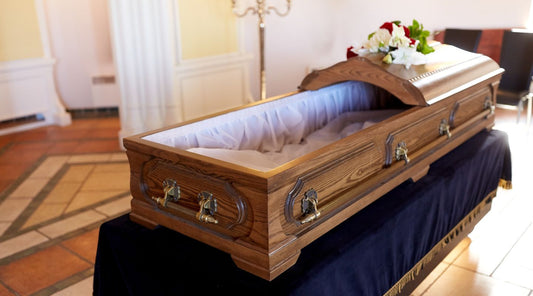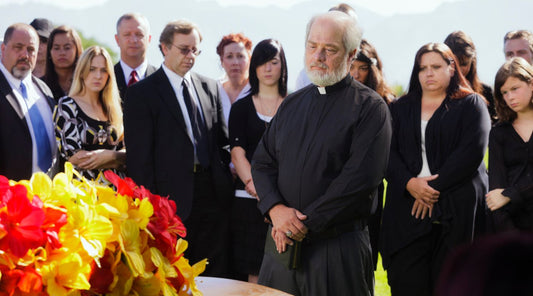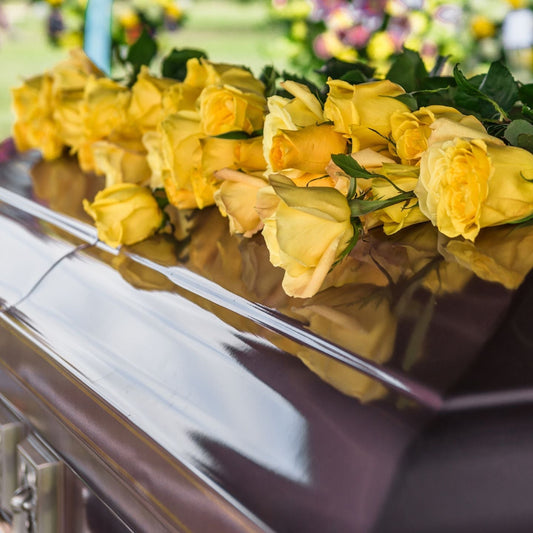
Getting Through the Loss of the Loved One
There is at least some comfort in the fact that everyone must address the issue of death at some point. This article is designed to do just that. Get you through life’s most traumatic moment. This article contains an overview of the funeral, information about helping grieving persons, and some ideas about funeral planning.
For example, “Getting Through Loss of the Loved One” will help you plan ahead for your own or your spouse’s funeral, or act as a guide through a more sudden, unplanned event.
WHY DO WE HAVE FUNERALS ANYWAY?
The first reaction when someone thinks about funerals is often negative. An extremely unpleasant task done only out of a sense of duty. But when you think about it, funerals make perfect sense. Funerals help synchronize the feelings of survivors. They bring your family and friends together, so everyone may share strength and support. Reflect, reaffirm, even celebrate your relationship with the deceased. Confirming the reality of death with a chance to say “good bye.” Renew religious connections in some cases. And help appreciate the gift of life. Why do we have funerals? Because during traumatic times, it’s just what everyone needs.
THE PEOPLE THAT HELP YOU GET THROUGH.
When someone dies, things tend to become a disorienting haze. And you'll need help to get through. The best people to turn to during times like these are your funeral director and your clergy person. Chances are you already know clergy people of some kind. They will not only help you with some of the funeral details but offer spiritual guidance of a kind that no one else can offer. There is some chance you don’t know a funeral director. If you don’t, get to know one. Call and make an appointment. They are the people who will help you the most during these times. Whatever you do, make sure you get help. Make sure you let your family and friends give you emotional support. Some people make the mistake of pushing away those closest to them. Don’t try to do this alone.
WHAT CAN YOUR FUNERAL DIRECTOR DO FOR YOU?
You are not alone in this. Your family and friends are there to comfort you. But some of the best comforts you can get during this whole process is information. Most information about funerals comes from your funeral director. A call to the funeral director is one of the first calls you should make. They will arrange transportation of the deceased to the funeral home. Shortly thereafter, they will set a meeting with you, and together, you'll make some decisions. Here's what to expect:
Planning The Services: Calling Hours and Funeral
- The date, hour and place of the calling hours and funeral service.
- Who will preside over the service?
- Funeral transportation for the family.
- Selection and purchase of the casket and burial vault.
- Selection and purchase assistance of grave marker or monument and cemetery lot.
- Flower arrangements.
- Selection of music, pallbearers.
- Clothing for the deceased.
Informing and Care of Loved Ones
- Placement of obituary and funeral notices.
- Notification of friends and relatives.
Paperwork Assistance
- Burial permits and death certificates.
- Certified copies of the death certificate or registration needed to file claims for Social Security, insurance, Veterans Administration, pensions or welfare.
A BRIEF FUNERAL GLOSSARY.
To Be Used When Conversing With Your Funeral Director
Funeral: Throughout history, funerals have been held in every country and culture. It is a meaningful and purposeful ceremony, like a birthday, baptism or marriage. By definition, the funeral is a tribute.
Casket: An enclosure for the body of the deceased, generally made of woods or metals.
Burial vault: A protective enclosure around the casket that provides protection for the casket and its contents against water and elements in the soil; also prohibits the ground from settling.
Clothing: In the case of the funeral or viewing, the deceased’s own clothing may be used, or the funeral director may offer a selection of new clothing.
Memorial: A gift in memory of the deceased.
Monument or Marker: A plaque, structure, or tablet, usually made of stone or metal, to identify the place of burial.
Organ Donation: The donation of a functioning internal organ or organs to an organ bank. Advancements in medical science have made organ donation popular. Details about organ donation can be obtained by calling the Organ Donor’s Hotline at 1-800-243-6667.
THERE’S A WAY TO A WILL.
Why make a will? If you care about your loved ones, it’s absolutely essential.
Without a legal will, you’ll leave behind conflict and confusion among your family and friends during an emotional time. It will be difficult for survivors to claim their rightful inheritance after your death. Not to mention the delays and costs in court, and having your property divided by strangers. To simplify matters, develop a legal will. You may also want a Living Will and a Durable Power of Attorney for health care. These two documents will express your wishes if you are unable to make decisions regarding your own medical care. There is only one foolproof way to a will. A lawyer. There are many effective books, kits, even computer programs
about the subject. They are great references. But if you want a personalized will, you need a lawyer.
HELPING A FRIEND GET THROUGH.
Someone who helps a friend or family member get over the death of a loved one is a friend indeed. Almost everyone has the impulse to help. But many people don't know how. Here are some tips.
- Get in touch as soon as possible. Call your friend. Hearing from people helps. If you’re searching for something to say, start with “I’m so sorry,” and offer to help in any way.
- Be yourself. Simple honest words are better than cliches such as: “He is out of his pain.” “You’re young enough to have another child.” “It was God’s will.”
- Listen and observe. Being a good listener is the best thing you can do. Don’t force conversation, but if your friend feels like talking, be there. Do not criticize, try to change the subject or probe for details about the death. Look for others who may need support.
- Offer to make calls. Sometimes, it gets repetitive and difficult for your friend to relive the experience over and over again.
- Lend a hand with everyday tasks. Answer the phone. Greet visitors. Help with shopping or transportation. Prepare a meal. Care for the children or grandchildren.
- Send a thoughtful note. Keep it simple. Remind the survivor of a pleasant time you once shared. A from-the-heart letter will become a cherished keepsake.
AFTER THE FUNERAL
- Keep in touch with your friends. Make a point to call regularly, to visit or invite your friend to do things with you.
- Help your friend return to outside activities. People are different; some are ready soon, some take a long time.
- Let your friend know that you will be available for as long as needed. Understand that healing doesn’t happen overnight. Recovery can take years.
- Be a “sounding board” for the bereaved person. Also, you might refer your friend to a local bereavement support group.
HELPING A CHILD GET THROUGH.
Chances are when someone dies, there are children involved. They may be young children of the deceased person, grandchildren, nieces, and nephews, or the children of friends. Here are some simple guidelines when dealing with children at the time of a death or a funeral:
- Tell them what happened. Do not try to shield them from the fact of death. They usually know all that is happening, even if you don’t tell them. If you are dishonest with them, the result is a confused child who no longer trusts you. And trust is difficult to regain.
- Be ready for the questions. They will ask you some difficult ones. Whatever you do, don’t “makeup” answers. Keep all the answers simple and direct. If you don’t know an answer, it is fine to say, “I do not know, but I will try to find out.”
- Ask them what they think. Instead of trying to answer a particularly tough question, ask them about their thoughts on the matter. They will often reveal the fear or fantasy behind the question.
- Some common questions: Did I cause the death? Will I die of the same cause/illness? Will I die when I reach the same age? Will I be punished for thinking about hurting or killing people?
- Reassure them. Children need to know that they will be cared for as always.
- Encourage them to go to the funeral. If parents cannot devote sufficient time or attention to their children because of their own involvement or their own grief, a friend’s assistance can help immeasurably.
- Explain what happens at funerals. A visit to the funeral home in advance of the funeral service provides an opportunity to sense what is happening and to ask questions. Funeral directors can answer children’s questions too.
- Get a book. There are several excellent books designed to help parents explain death to children. Funeral directors have a wide variety, so do public libraries.
Blog Author: Tim



